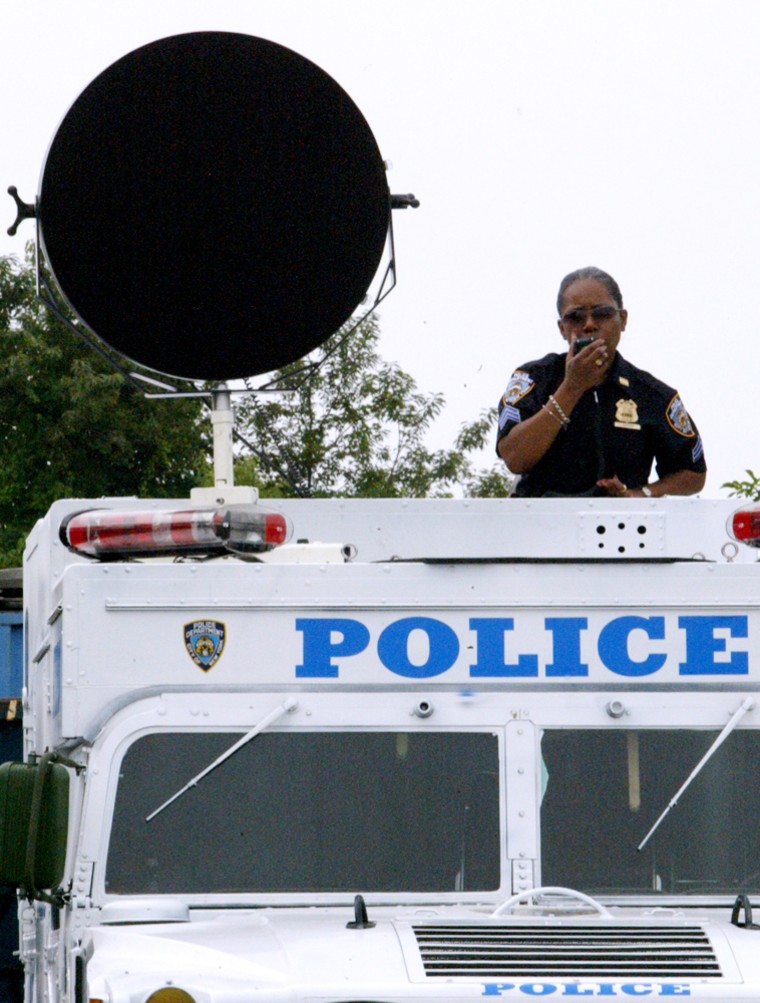Gary Boston and Jeff Adler are just two guys with a dream: shutting down New York City for a day. What they want is a general strike, with everyone from Broadway dancers to Madison Avenue street sweepers calling in sick Wednesday to protest the Republican National Convention.
Both men are in their 30s and have full-time jobs, and neither has any organizing experience. Boston, who had never built a Web site before, put together ShutItDownNYC.com in three days, using Microsoft FrontPage software and the book "FrontPage for Dummies." The site has received more than 22,000 hits since it launched in late June.
"It's pretty amazing the amount of attention we've been able to generate with very simple tools," said Boston, a Wall Street analyst.
Technology has changed how protests are organized.
Activists are using the Internet to arrange housing for out-of-towners, organize a mass-flash of underwear emblazoned with anti-Bush messages and tell protesters what to say if they're arrested ("I am going to remain silent. I would like to speak with a lawyer.").
There are at least two Web guides for protesters packed with calendars of events and dining guides -- including Dumpster diving tips for those on a tight budget.
Cell phones work well for on-the-fly mobilizations, and text messages add to their power. Some protesters are signing up for 10 p.m. daily text updates telling them where the next day's events will be.
The phones have also put a technological twist on street theater.
An activist who calls himself Rev. Billy and members of his organization, The Church of Stop Shopping, plan to gather Tuesday at the commuter train station at Ground Zero, where they are to mill around reciting lines from the First Amendment into their cell phones for a half-hour, then recite it together, then disperse.
Law enforcement has new gadgets, too
Technology, predictably, has also changed crowd control and surveillance.
Earlier this month, the New York Police Department showed off a machine called the Long Range Acoustic Device, developed for the military and capable of blasting at an earsplitting 150 decibels -- as loud as a firecracker, a jet engine taking off or artillery fire at 500 feet, according to the Noise Center at the League for the Hard of Hearing.
The NYPD said it would use the machine to direct crowds to safety if there's a terrorist attack or remind protesters where they're allowed to march. Police said they wouldn't use the earsplitting screeching noise feature at the convention.
"It's only to communicate in large crowds," Inspector Thomas Graham of the police department's crowd control unit said.
Free speech advocates say New York's police have videotaped past protests, so organizations like United for Peace and Justice are encouraging protesters to bring their own video cameras to videotape the police. A Web protest guide from Just Cause Law Collective suggests that protesters who see police brutality document it by leaving a detailed cell phone message for themselves or recording what they see on their portable music player.
Mobile bloggers, or mobloggers, are expected to show up in droves and quickly post on the Web photos, text and even video chronicling events as they happen.
"People will be able to quickly upload what is being seen, what is being felt and what is being done," said Ricardo Dominguez, co-founder of a tech-steeped civil disobedience group called The Electronic Disturbance Theater. "We will be able to keep an eye on the police the same way they keep an eye on us."
The New York chapter of the American Civil Liberties Union will be using cell phones and two-way pagers to monitor demonstrations. Its legal team will be in close contact with the police "so we can hear about problems and trouble-shoot them instantly," said Donna Lieberman, executive director of the New York Civil Liberties Union.
Will the convention be a target for hackers?
"The word 'target' is inappropriate," said Emmanuel Goldstein, editor and publisher of 2600, a hacking magazine. "Hackers are interested in what the cops are doing, how the city is being operated during that (convention) period, what kinds of technology are being implemented here for the first time, as well as all sorts of ways to infiltrate and spread information."
Not many hackers are warning of electronic disruption.
One speaker at this summer's Defcon, an annual hackers conference, advocated disrupting the convention. And one group released tools online to mount so-called denial-of-service attacks aimed at overwhelming the main Web sites for the convention, the Republican National Committee and the Bush campaign, said Greg Shipley, chief technology officer of the security company Neohapsis Inc. Such tactics have been used in the past to try to disrupt annual meetings of the global business elite run by the World Economic Forum.
"I don't anticipate much of an online 'hacker' response," said Bryan Burns, who attended Defcon. "People I know who can hack and are politically motivated see themselves as more effective doing civil disobedience in person."
